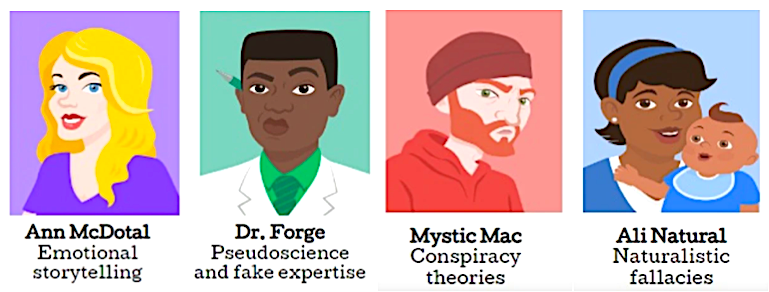Psychological inoculation improves resilience to and reduces willingness to share vaccine misinformation
The four characters that represent the misinformation strategies addressed throughout the ‘Bad Vaxx’ game.
PUBLICATION
Nature
AUTHORS AND RESEARCHERS
Ruth E. Appel, Stanford University
Jon Roozenbeek, University of Cambridge
Rebecca Rayburn-Reeves, Duke University
Melisa Basol, University of Cambridge
Jonathan Corbin, Duke University
Josh Compton, Dartmouth College
Sander van der Linden, University of Cambridge
ABSTRACT
Vaccine misinformation endangers public health by contributing to reduced vaccine uptake. We developed a short online game to reduce people’s susceptibility to vaccine misinformation. Building on inoculation theory, the Bad Vaxx game exposes people to weakened doses of manipulation techniques commonly used in vaccine misinformation and to strategies to identify these techniques. Across three preregistered randomized controlled trials (N = 2,326), we find that the game significantly improves participants’ ability to discern vaccine misinformation from non-misinformation, their confidence in their ability to do so, and the quality of their sharing decisions. Further, taking the perspective of a character fighting as opposed to spreading misinformation is more effective on some outcome measures. In line with the learning goals of the intervention, we show that participants improve their ability to correctly identify the use of specific misinformation techniques. This insight is important because teaching manipulation technique recognition is not only effective to help evaluate information about vaccines, but also more viable than trying to debunk myriads of constantly-evolving myths. Our findings suggest that a short, low-cost, gamified intervention can increase resilience to vaccine misinformation.
READ THE RESEARCH PAPER IN ITS ENTIRETY
PLAY THE ‘BAD VAXX’ GAME
RELATED RESEARCH PAPERS FROM THE INTEGRITY PROJECT




